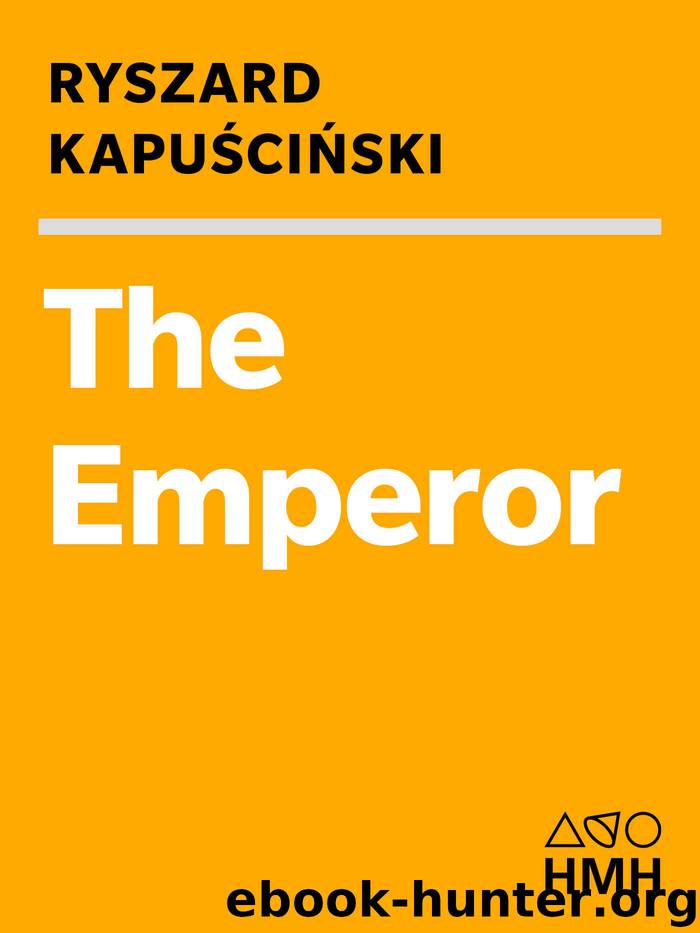The Emperor: Downfall of an Autocrat by Ryzard Kapuscinski

Author:Ryzard Kapuscinski [Kapuscinski, Ryzard]
Language: eng
Format: azw3
Publisher: Houghton Mifflin Harcourt
Published: 1983-03-01T05:00:00+00:00
He goes on to say that even though the Emperor considered the December upheaval to be over and done with and never returned to the subject, the coup staged by the Neway brothers continued to have destructive consequences for the Palace. As time passed, these consequences grew more powerful rather than weaker, and they changed the life of the Palace and the Empire. Having suffered such a blow, the Palace would never again know true, sweet peace.
Things were gradually changing in town, too. The first mention of disturbances appeared in the secret reports by the police. Fortunately, as my informant says, these were not yet disturbances on a great, revolutionary scale, but rather—at first—tremors, slight oscillations, ambiguous murmurs, whispers, sniggering, a sort of excessive heaviness in people, lying around, drooping, a certain messiness, all expressing some kind of avoidance and refusal. He admits that cleanup operations couldn’t start on the basis of these reports. The information was too vague, even comfortingly innocent; it stated that something was hanging in the air, without saying precisely what and where. And without specifics, where was one to send the tanks, and in what direction order the shooting? Usually the reports stated that these murmurs and whispers came from the university—a new one, the only institution of higher learning in the country—in which, from God knows where, there had appeared skeptical, unfriendly individuals, ready to spread harmful and unverified calumnies for the sole purpose of causing new anxieties for the Emperor. He goes on to say that the monarch, in spite of his advanced age, maintained a perspicacity amazing to those around him, and that he understood better than his closest followers that a new era was coming and it was time to pull together, to bring things up to date, to speed up, to catch up. To catch up, and even to overtake. Yes, he insists, even to overtake. He confesses (today one can talk about it) that a part of the Palace was reluctant to embrace these ambitions, muttering privately that instead of giving in to the temptation of certain novelties and reforms, it would be better to curb the Western inclinations of youth and root out the unreasonable idea that the country should look different, that it should be changed.
The Emperor, however, listened to neither the aristocratic grumbling nor the university whispers, believing as he did that all extremes are harmful and unnatural. Demonstrating innate concern and foresight, the Emperor widened the scope of his power and involved himself in new domains, manifesting these new interests by introducing the Hour of Development, the International Hour, and the Army-Police Hour, between four and seven in the afternoon. With the same goals in mind, the Emperor created appropriate ministries and bureaus, branch offices, and commissions, into which he introduced hosts of new people, well behaved, loyal, devoted. A new generation filled the Palace, energetically carving out careers. It was, recalls P.M., the beginning of the 1960’s.
Download
This site does not store any files on its server. We only index and link to content provided by other sites. Please contact the content providers to delete copyright contents if any and email us, we'll remove relevant links or contents immediately.
| Africa | Americas |
| Arctic & Antarctica | Asia |
| Australia & Oceania | Europe |
| Middle East | Russia |
| United States | World |
| Ancient Civilizations | Military |
| Historical Study & Educational Resources |
Goodbye Paradise(2985)
Men at Arms by Terry Pratchett(2414)
Tobruk by Peter Fitzsimons(2068)
Pirate Alley by Terry McKnight(1914)
Arabs by Eugene Rogan(1845)
Borders by unknow(1792)
Belonging by Unknown(1474)
The Biafra Story by Frederick Forsyth(1330)
It's Our Turn to Eat by Michela Wrong(1309)
Botswana--Culture Smart! by Michael Main(1242)
A Winter in Arabia by Freya Stark(1228)
Gandhi by Ramachandra Guha(1199)
Coffee: From Bean to Barista by Robert W. Thurston(1186)
Livingstone by Tim Jeal(1156)
The Falls by Unknown(1147)
The Source by James A. Michener(1140)
The Shield and The Sword by Ernle Bradford(1106)
Egyptian Mythology A Fascinating Guide to Understanding the Gods, Goddesses, Monsters, and Mortals (Greek Mythology - Norse Mythology - Egyptian Mythology) by Matt Clayton(1091)
Africa: Altered States, Ordinary Miracles by Richard Dowden(1083)
